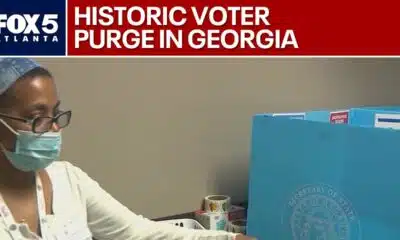News from the South - Kentucky News Feed
‘No Kings on Presidents Day’: Anti-Trump protestors rally at Kentucky Capitol
‘No Kings on Presidents Day’: Anti-Trump protestors rally at Kentucky Capitol
by Jamie Lucke, Kentucky Lantern
February 17, 2025
FRANKFORT — Bundled up against sub-freezing cold and hoisting homemade signs, more than 200 people gathered in front of the Kentucky Capitol Monday for the second anti-Trump rally in as many weeks.
The event was part of “No Kings on Presidents Day” protests around the country organized by the 50501 Movement which first held anti-Trump protests in all 50 states on Feb. 5.
Victor Fain of Elizabethtown, who also attended the Feb. 5 rally in Frankfort, said the Monday gathering appeared to have attracted more people. Explaining why he was there, Fain said, “I feel like this administration is uniquely dangerous. Trump has radicalized me.”
Since taking office Jan. 20, Republican President Donald Trump has moved swiftly through executive orders and federal workforce reductions to remake the government. The president empowered billionaire Elon Musk to cut personnel and costs and make other changes in federal agencies via the Trump-created Department of Government Efficiency (DOGE).
Trump’s actions are being challenged in multiple lawsuits, including one joined by Kentucky Gov. Andy Beshear challenging Trump’s freeze on federal payments, which Beshear said is affecting Medicaid, the Appalachian Regional Commission and the Abandoned Mine Lands program in Kentucky. “We deserve to be able to rely on the agreements that a federal government has made, regardless of what party is in power,” Beshear said last week in announcing he had joined the suit filed by Democratic state attorneys general.
Sherman Fracher of Harrodsburg, who hoisted a sign that said “No Kings,” told the Lantern, “We have to do something. We can’t just sit by and watch it crumble. They have to know we’re not just going to lie down and let them take the government.”
Between chants of “We will not let freedom die” and “This is what America looks like,” the crowd was urged by speakers to contact their representatives in Congress to register their opposition to the Trump agenda.
The Kentucky legislature was not in session Monday.
Kentucky Lantern is part of States Newsroom, a nonprofit news network supported by grants and a coalition of donors as a 501c(3) public charity. Kentucky Lantern maintains editorial independence. Contact Editor Jamie Lucke for questions: info@kentuckylantern.com.
The post ‘No Kings on Presidents Day’: Anti-Trump protestors rally at Kentucky Capitol appeared first on kentuckylantern.com
News from the South - Kentucky News Feed
WKU baseball holds youth camp at Nick Denes Field
SUMMARY: During summer break at WKU, the baseball camp energized Nick Denes Field with boys aged 6-12 learning hitting, throwing, fielding, and sliding. Hilltopper pitcher Gavin Perry actively coached, challenging campers with batting practice while keeping the atmosphere fun. Perry joked about losing count of home runs given up, highlighting the camp’s competitive yet enjoyable spirit. WKU director of operations Derek Francis emphasized the importance of remembering baseball as a fun game, noting how the kids’ enthusiasm and positive attitudes remind coaches of the joy in sports often overlooked in higher levels.
The post WKU baseball holds youth camp at Nick Denes Field appeared first on www.wnky.com
News from the South - Kentucky News Feed
Franklin man charged after marijuana operation found in home
SUMMARY: A Franklin, Kentucky man, Terry Moss, 60, was arrested following an investigation by the South Central Kentucky Drug Task Force on July 10. Authorities discovered an indoor marijuana cultivation operation at his residence on South Main Street. Moss faces multiple charges, including marijuana cultivation (five plants or more) with firearm enhancement, marijuana trafficking with firearm enhancement, drug paraphernalia possession, and first-degree possession of controlled substances including hydrocodone. The search uncovered several marijuana plants, processed marijuana, two firearms, drug paraphernalia, prescription pills, and U.S. currency. Charges will be presented to a grand jury. Multiple local law enforcement agencies assisted in the operation.
The post Franklin man charged after marijuana operation found in home appeared first on www.wnky.com
News from the South - Kentucky News Feed
100 years after John Scopes was convicted of teaching evolution, education is again on trial
by Berry Craig, Kentucky Lantern
July 10, 2025
Today I’m remembering what Lela Scopes told me about her famous brother for my Paducah Sun story going on 46 years ago.
She said before John Thomas Scopes left to teach science and coach football at Rhea County High School in Dayton, Tenn., in 1924, he explained, “I’m going there because it’s a small town with a small school where I won’t get in any deep water.”
The skinny, bespectacled, freckle-faced 24-year-old from Paducah ended up the defendant in one of history’s most sensationalized courtroom battles.
A century ago this month, Scopes was convicted of violating the Butler Act, a Volunteer State law that forbade the teaching of evolution in public schools. His punishment was a $100 fine.
But the “Monkey Trial” grabbed newspaper headlines worldwide. Dozens of reporters converged on Dayton. So did tent revivalists and swarms of hucksters hawking popcorn and pink lemonade and hustling Bibles and souvenirs, including stuffed monkeys.
“The State of Tennessee v John Thomas Scopes” was also the first trial broadcast live on radio.
I interviewed Lela Scopes in August 1979, when I was a Sun feature writer. She also said John had worried about what their mother might think of the trial: “He was afraid it would get in the Louisville paper, Mother would read about it and think he was a hothead.”
Anyway, as Mark Twain said, “history doesn’t repeat itself, but it often rhymes,” and now is one of those rhyming times.
“Public education is once again under siege from a sustained effort by Christian Nationalists to blur the line between church and state,” warns A.J. Schumann, a youth organizing fellow with Americans United for Separation of Church and State.
Like today, the 1920s were times of “rapid social, economic and cultural change,” said David Krueger, professor emeritus of history at West Kentucky Community and Technical College in Paducah.
Scopes admitted he covered evolution when he substitute taught for the absent biology teacher. (In their zeal to ban evolution, Tennessee lawmakers failed to remove the state-approved biology textbook, which included evolution.)
Scopes believed in evolution and agreed to stand trial on principle.
The trial, which began on July 10, 1925, and concluded on July 21, was essentially a clash of competing values: urban science and modernism versus rural, old-time Protestant fundamentalist Christianity.
“The cause defended at Dayton is a continuing one that has existed throughout man’s brief history and will continue as long as man is here,” Scopes wrote in “Center of the Storm,” his 1967 memoir. “It is the cause of freedom, for which man must do what he can.”
The attorneys embodied the collision of values. Tennessee summoned William Jennings Bryan of Nebraska as special prosecutor. A fundamentalist champion, he had been a Democratic congressman, secretary of state and three-time Democratic presidential candidate.
The American Civil Liberties Union hired Clarence Darrow to lead Scopes’ defense team. Darrow was widely considered the country’s top defense lawyer. He was from Chicago, believed in evolution and was an agnostic.
Bryan and Darrow dueled like gladiators in the sweltering midsummer East Tennessee heat. The courtroom became so hot that the trial was moved outdoors to the tree-shaded courthouse lawn where the crowd of spectators grew even larger.
Bryan got a conviction as expected. But progressives, including liberal Christians, believed science and reason had vanquished “EVIL-lution” in the court of public opinion. They pointed to July 20 when Darrow called Bryan to the stand as a Bible expert.
“There was no pity for the helplessness of the believer come so suddenly and so unexpectedly upon a moment when he could not reconcile statements of the Bible with generally accepted facts,” The New York Times reported. “There was no pity for his admissions of ignorance of things boys and girls learn in high school, his floundering confessions that he knew practically nothing of geology, biology, philology, little of comparative religion, and little even of ancient history.”
… separation of church and state is not something we can take for granted. It is a principle that must be actively defended, especially in moments of cultural anxiety and political division, when calls to return to some mythic past grow loudest.”
– A.J. Schumann, Americans United for Separation of Church and State
In “Only Yesterday,” his 1931 chronicle of the 1920s, Frederick Lewis Allen wrote: “Theoretically, Fundamentalism had won, for the law stood. Yet really Fundamentalism had lost. Legislators might go on passing anti-evolution laws, and in the hinterlands the pious might still keep their religion locked in a science-proof compartment of their minds; but civilized opinion everywhere had regarded the Dayton trial with amazement and amusement, and the slow drift away from Fundamentalist certainty continued.”
Allen and the progressives of his day missed the mark. Donald Trump and his Republican Party owe a big part of their electoral success to white Christian evangelicals of the “God said it. I believe it. That settles it.” persuasion.
Schumann warned that “today’s Christian Nationalist rhetoric echoes the anti-modernist anxieties of the 1920s — fear that secularism is destroying ‘traditional values’ and that public institutions should reflect a ‘Christian America.’”
He wrote that the First Amendment safeguards all Americans “from having any single belief system imposed on them by the state,” a fact that seems to be lost on much of the GOP these days.
Schumann concluded that the Scopes “trial reminds us that the separation of church and state is not something we can take for granted. It is a principle that must be actively defended, especially in moments of cultural anxiety and political division, when calls to return to some mythic past grow loudest.”
Scopes died in 1970 at age 70. He is buried in the family plot in Paducah’s Oak Grove Cemetery next to his wife, Mildred, and close to Lela, who died in 1989 at 92. “A Man of Courage” is his epitaph. A state historical marker at the cemetery’s main entrance tells about him.
Scopes said not a word during the trial. He got his chance at the end.
After the jury delivered the expected guilty verdict and the judge fined Scopes $100, one of his lawyers pointed out that the defendant had been denied the right to speak before sentencing.
“Your Honor, I feel that I have been convicted of violating an unjust statute,” Scopes said. “I will continue in the future, as I have in the past, to oppose this law in any way I can. Any other action would be in violation of my ideals of academic freedom, that is to teach the truth as guaranteed in our Constitution, of personal and religious freedom. I think the fine is unjust.”
After Scopes finished, the judge repeated the fine. The verdict was later overturned on a technicality, Schumann wrote, but the Butler Act wasn’t repealed until 1967.
GET THE MORNING HEADLINES.
Kentucky Lantern is part of States Newsroom, a nonprofit news network supported by grants and a coalition of donors as a 501c(3) public charity. Kentucky Lantern maintains editorial independence. Contact Editor Jamie Lucke for questions: info@kentuckylantern.com.
The post 100 years after John Scopes was convicted of teaching evolution, education is again on trial appeared first on kentuckylantern.com
Note: The following A.I. based commentary is not part of the original article, reproduced above, but is offered in the hopes that it will promote greater media literacy and critical thinking, by making any potential bias more visible to the reader –Staff Editor.
Political Bias Rating: Center-Left
The content presents a viewpoint that emphasizes the importance of separating church and state and supports scientific education, framing the Scopes Trial as a historic battle between modernism and religious fundamentalism. It highlights concerns about contemporary Christian Nationalist influence on public education, particularly critiquing elements within the GOP, which indicates a critical stance toward conservative religious politics. However, it maintains a respectful historical recount and balanced tone by providing factual background and quoting multiple perspectives, reflecting a generally moderate but slightly progressive viewpoint favoring secularism and academic freedom.
-
News from the South - Arkansas News Feed7 days ago
Real-life Uncle Sam's descendants live in Arkansas
-
News from the South - Georgia News Feed6 days ago
'Big Beautiful Bill' already felt at Georgia state parks | FOX 5 News
-
News from the South - Oklahoma News Feed6 days ago
LOFT report uncovers what led to multi-million dollar budget shortfall
-
Local News6 days ago
Maroon Tide football duo commits to two different SEC Teams!
-
The Center Square4 days ago
Here are the violent criminals Judge Murphy tried to block from deportation | Massachusetts
-
News from the South - South Carolina News Feed7 days ago
South Carolina lawmakers react as House approves Trump’s sweeping economic package
-
News from the South - Texas News Feed6 days ago
Hill Country flooding: Here’s how to give and receive help
-
News from the South - North Carolina News Feed6 days ago
Raleigh caps Independence Day with fireworks show outside Lenovo Center








































